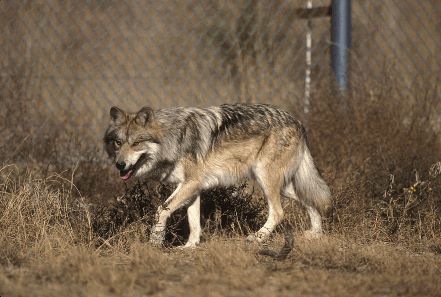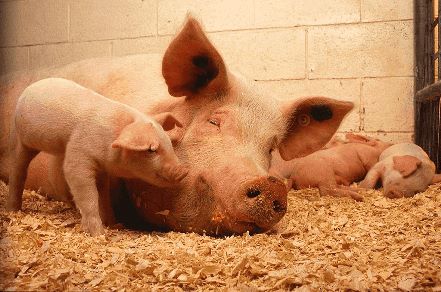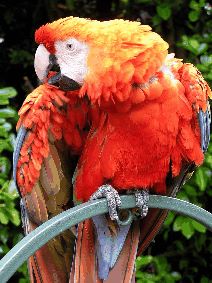Revisited
Words From The Names Of Animals

|
Editor's note: This article is a reprint from "Stories That Words Tell Us" By Elizabeth O'Neill. It was originally published in 1918. It is easy to see how names of persons have sometimes changed into general words. But we have also a great number of general words which are taken from animals' names. Most often these words are used to describe people's characters. Sometimes people are merely compared with the animals whose qualities they are supposed to have, and sometimes they are actually called by the names of these animals. Thus we may say that a person is "as sly as a fox," or we may call him an "old fox," and every one understands the same thing by both expressions. In those early days, when town life hardly existed, everybody knew all about animals and their habits. The cause of this continual comparison of human beings with animals is that long ago, when these expressions first began to be used, animals, and especially wild animals, played a great part in the lives of the people. In the Middle Ages great parts of England, now dotted over with big towns, were covered with forest land. Wolves roamed in the woods, and the fighting of some wild animals and the taming of others formed a most important part of people's lives. The same thing was, of course, the case in other countries. So familiar were people in those days with animals that they thought of them almost as human beings and believed that they had their own languages. It was people who believed these things who made up many of the old fairy tales about animals--stories like "Red Riding Hood" and the "Three Bears." We often say that we are "as hungry as a wolf;" but we who have never seen wolves except behind the bars of their cages at the Zoological Gardens do not know how hungry a wild wolf can be. Those, however, who first used this expression thought of the lean and hungry wolves who prowled round the farms and cottages in the hard winter weather, driven by starvation to men's very doors. We also have the expression, "a wolf in sheep's clothing." By this we mean a person who is really dangerous and harmful, but who puts on a harmless and gentle manner to deceive his victim.  The hungry wolf, the villian of childhood stories and the theme of pop songs. Another use of the word wolf is as a verb, meaning to eat in a very quick and greedy manner, as we might imagine a hungry wolf would do, and as our forefathers knew by experience that they did do. Most of the people who use the names of the wolf and the fox in these ways do not know anything of the habits of these animals, but the expressions have become part of the common language. The same thing is, of course, true about the lion, with which even our far-off English ancestors had never to fight. But the lion is such a fierce and magnificent animal that it naturally appeals to our imagination, and we find numerous comparisons with it, chiefly in poetical language. We say a soldier is as "brave as a lion," or describe him as a "lion in the fight." A less complimentary comparison is an expression we often hear, "as stubborn as a mule." Only a few of the people who use this expression can have had any experience of the stubbornness of mules. Sometimes a stubborn person is described quite simply as a "mule." Another compliment of the same sort is to call a person who seems to us to be acting stupidly a "donkey."  A sleeping pig, neither disgusting nor dirty. We may say a person is as "greedy as a pig," or describe him with disgust as a "pig," which may mean either that they are very greedy or that they are behaving in a very ungracious or unmannerly way. A more common description of a person of this sort is "a hog." Every one has heard of the "road hogs," who drive their motors regardless of other people's convenience or safety; and of the "food hogs," who tried to store up food, or refused to ration themselves, and so shortened other people's supplies of food in the Great War. Other common expressions comparing people with animals are--"sulky as a bear," "gay as a lark," "busy as a bee." We might also call a cross person a "bear," but should not without some explanation call a person a "lark" or a "bee."  The parrot, a colorful word bird We may say a person "chatters like a magpie," or we may call him or her a "magpie." A person who talks without thinking, merely repeating what other people have said, is often called a "parrot." Sometimes names of common animals or birds used to describe people are complimentary, but more often they are not. It seems as though the people who made these metaphors were more eloquent in anger than in love. A very nice child will be described by its friends as a "little duck." A mischievous child may also be described good-temperedly as a "monkey;" but there are far more words of abuse taken from the names of animals than more or less amiable words like these. A bad-tempered woman is described as a "vixen," or female fox; a lazy person as a "drone," or the bee which does no work. A stupid person may be called a "sheep" or a "goose" (which is not quite so insulting). Dog, hound, cur, and puppy are all used as words of abuse; and contempt for some one who is regarded as very mean-spirited is sometimes shown by describing such a person as a "worm," or worse, if possible, a "reptile." A "bookworm," on the other hand, the name of a little insect which lives in books and eats away at paper and bindings, is applied to people who love books in another way--great readers--and is, of course, not at all an uncomplimentary word. A foolish person who has been easily deceived in some matter is often described as a "gull," or is said to have been "gulled." Gull is now the name of a sea-bird, but in Early English it was used to describe any young bird, and from the idea that it is easy to deceive such youngsters came the use of the word to describe foolish people.  Is a gull really that foolish? Another name of a bird used with almost the opposite meaning is rook. This name is given to people who are constantly cheating others, especially at card games. It was earlier used, like gull, to describe the person cheated. It then came to be used as a verb meaning "to cheat," and from this was used to describe the person cheating instead of the person cheated. |
| Revisited - Words From The Names Of Animals | ||||
| Writer: | Elizabeth O'Neill | |||
| Images: | ||||
| ||||
| Sources: | ||||
| ||||
All images are Copyright - CC BY-SA (Creative Commons Share Alike) by their respective owners, except for Petey, which is Public Domain (PD) or unless otherwise noted.
comments powered by Disqus



















